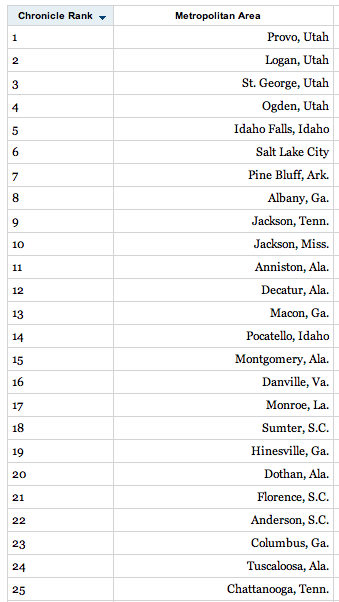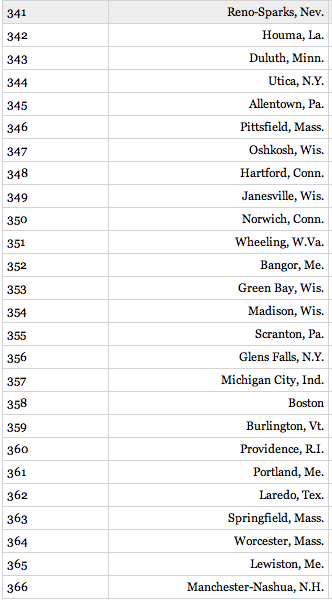The Chronicle of Philanthropy has released a comparison of the giving rates of all 366 major metropolitan areas. I won’t paste the whole chart, but I would direct your attention to the top 25 areas and the bottom 25. First, here’s the top 25:
And now, the bottom 25:
What do you notice about these charts? As we’ve long known, the more liberal and the more secular a person gets, the less likely they are to give money to charity, but these charts show rather starkly not just the regional but also the religious divides in generosity. I have three short observations:
1. Mormons rule. The top six cities are heavily Mormon — if not outright LDS-dominated. And the gap between the top-giving Mormon city and the top-giving Protestant city (Provo, Utah, versus Pine Bluff, Arkansas) is vast. Provo residents give a median 13.9% of discretionary income, while Pine Bluff residents give a median 8.9%. (For perspective, that’s the same percentage gap as exists between city number 7 on the chart and city number 128).
2. Yankees drool. Outside of the LDS-heavy states of Utah and Idaho, there is not one single city north of the Mason-Dixon line represented in the top 25. Not one. Meanwhile, 22 of the 25 lowest-ranked cities are northern. This is just one more piece of evidence that our regional differences are also cultural differences.
3. We can do better. It’s hard to look at the overall chart without thinking that we can do better, much better. For all the popularity of the underdog, for all the pop culture that celebrates acts of charity and giving, and for all the millions of words written about poverty and helping your fellow man, the truth is that we don’t put our money where our mouth is. The truth is that our words are often merely wind, and we allow our attitudes and ideologies to substitute for real virtue.
Aside from a precious few LDS communities, we should feel a sense of collective shame and individual conviction. Simply put, let’s give more.












